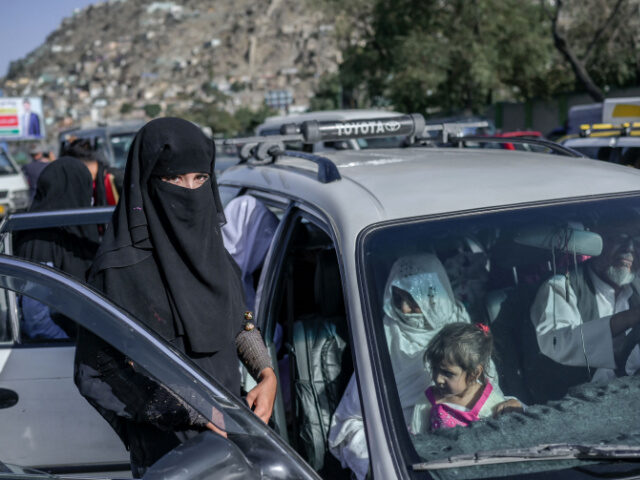The Afghan news organization Pajhwok reported Wednesday that drivers throughout Afghanistan are attempting to remain in the good graces of the repressive Taliban by frantically decorating their cars with Quranic verses and affirmations of the Islamic faith.
The Taliban is nearing the one-year anniversary of ousting the former government of Afghanistan on August 15, 2021, after leftist President Joe Biden violated an agreement with the Sunni terrorist group to extend the already 20-year war in the country. Pushing back the American withdrawal deadline from May to September and then moving it up to August prompted Taliban leaders to declare that they would no longer consider themselves bound by the agreement, which required them to cooperate with the U.S.-backed government. Then-President Ashraf Ghani fled the country immediately after reports surfaced of Taliban leaders reaching the city limits of Kabul, the national capital.
Taliban leaders initially promised to establish an “inclusive” and tolerant government upon seizing power but have largely abandoned that image, instead imposing its fundamentalist interpretation of sharia, or Islamic law, nationwide. Afghans must now contend with, among other repressive tactics, regular harassment from Taliban representatives of the “Ministry of Promotion of Virtue and Prevention of Vice,” bans on women leaving their homes unless absolutely necessary, a soft burqa mandate, and limitations on businesses that the Taliban considers haram.
The Taliban rule has also resulted in a chilling effect on secular displays generally. As Pajhwok detailed on Wednesday, prior to August 2021, drivers often used flowers or secular poems to decorate their cars. While the Taliban has not overtly banned displays of innocuous items such as flowers, many are choosing to replace them with expressions of Islamic devotion in the hopes of not falling victim to Taliban repression.
“Before the takeover of the ‘Islamic Emirate,’ vehicles were decorated with romantic poems, local proverbs, names of provinces, nicknames, photos of heart, flowers and other items,” Pajhwok reported, citing local shopkeepers who sell the decals. “These shopkeepers say after the fall of the past regime, people changed their mind and most vehicle owners have now pasted stickers that maintain Kalema-i-Tayyiba or short verses from the Holy Quran”:
The Kalema-i-Tayyiba is one of six Islamic phrases regularly recited by Muslims. It reads, “There is no god but Allah and Muhammad is his prophet.” It differs from the shahadah, or profession of faith, in that the latter begins with “I believe that.”
One shopkeeper in Kabul selling secular decals said his business had declined “80 percent” since the Taliban took power.
While some attributed the decline in sales to fear of using secular visuals, another businessman interviewed in Pajhwok suggested that the humanitarian crisis in Kabul is what had cratered the industry; people do not have enough expendable cash for decorations when food, medicine, and other necessities are so scarce.
“Vehicles decoration and sticker pasting business has declined. Decoration trend has declined because the economic situation of people is not sound,” that businessman, identified as Ziaullah Saeedi, told Pajhwok. ”
“In the past, most vehicles owners pasted the photos of warlords and their signs but now most used Kaleema-i-Tayyiba.”
The micromanaging of Afghans’ lives increased greatly with the establishment of the “Ministry for the Promotion of Virtue and Prevention of Vice,” an agency common to Islamist governments prominent in Saudi Arabia. In the short-lived Islamic State “caliphate,” its version of a morality police agency was particularly infamous for brutality. Riyadh, in contrast, has attempted to weaken its Virtue Ministry’s mandate. The Taliban announced in September 2021 that the Virtue Ministry would replace the former government’s Ministry of Women’s Affairs in September 2021.
The Ministry rapidly went to work enforcing the use of head coverings – calling them hijabs, or headscarves, but using illustrations of the full-body burqa in its propaganda – and establishing checkpoints to harass civilians for infractions such as not growing out their beards long enough or banning improper music. The ministry also closely monitors the movements of all women, whom Taliban leaders have insisted should only leave their homes if there is an emergency:
The Virtue Ministry also enforces bans on alcohol consumption, which violates sharia, and has worked to force drug addicts into violent and potentially deadly withdrawal sessions, later parading them in public as a sign of the success of the regime’s outreach to Afghan communities.
Taliban leaders have increasingly proclaimed the success of “our jihad” as months have gone by and fellow rogue regimes, such as those of China and Iran, have accepted their claim of being the legitimate government of Afghanistan.
“The success of the Afghan jihad is not only a source of pride for Afghans but also for Muslims all over the world,” Taliban Supreme Leader Mawlawi Hibatullah Akhundzada proclaimed in public remarks in July, a rare appearance for the jihadist leader, who has put effort into ensuring few photos or videos of him exist. Akhundzada announced that the Taliban “hopes for martyrdom” while insisting that “Islam is the religion of peace.”

COMMENTS
Please let us know if you're having issues with commenting.